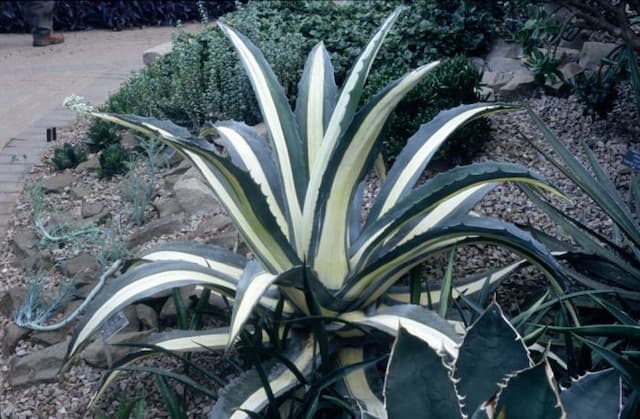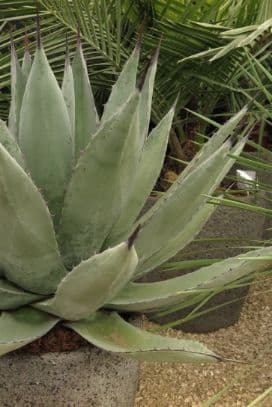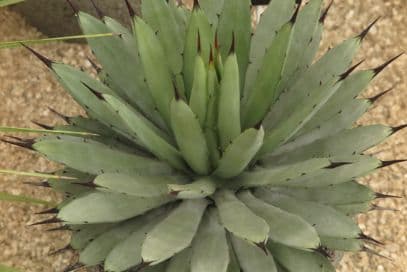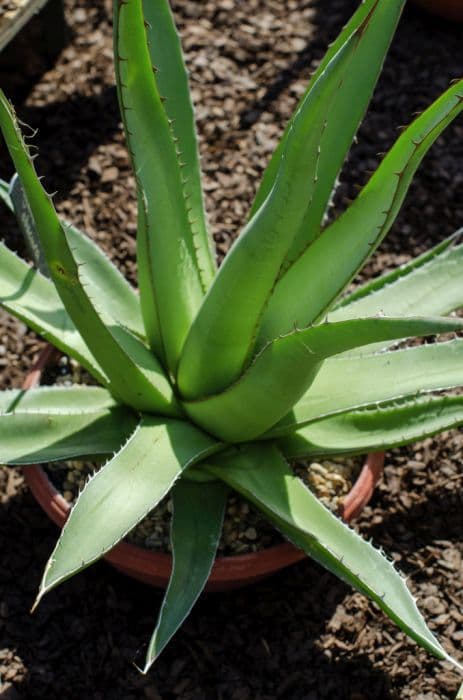Solomon's Seal Polygonatum odoratum 'Silver Wings' (v)

ABOUT
Polygonatum odoratum 'Silver Wings', commonly known as the fragrant Solomon's seal, features a series of unique visual characteristics that contribute to its ornamental appeal. This perennial plant possesses arching stems that create a graceful, flowing shape. Upon these stems, one can observe the alternating pattern of the leaves, which are variegated with creamy-white edges resembling silver wings, giving the plant its distinctive cultivar name. The leaves themselves are broad, oval-to-lance-shaped, and exhibit a glossy smooth texture adding a lush greenery effect to the overall presentation. In the blooming season, the fragrant Solomon's seal is adorned with small, tubular flowers that are typically white or pale green. These flowers dangle delicately from the leaf axils, hanging in pairs or sometimes solitarily, and exude a light, sweet scent that is particularly noticeable on calm, warm days. Following the flowering period, the fragrant Solomon's seal may produce berry-like fruits. These small spheres can show a transition in color from green to a dark, almost black hue when they reach maturity. This contrast against the foliage adds yet another layer of visual interest to the plant. Throughout the growing season, the fragrant Solomon's seal maintains a poised and structured appearance, contributing an elegantly natural look to shaded garden spaces, woodland areas, or along borders where its detailed foliage and subtle flowering can be appreciated up close. The overall combination of its arching stems, variegated leaves, pendulous fragrant flowers, and eventual dark fruits makes the fragrant Solomon's seal a captivating addition to any garden setting.
About this plant
 Names
NamesFamily
Asparagaceae.
Synonyms
Variegated Solomon's Seal, Fragrant Solomon's Seal, Striped Solomon's Seal, Scented Solomon's Seal.
Common names
Polygonatum odoratum 'Silver Wings' (v).
 Toxicity
ToxicityTo humans
Polygonatum, also known as Solomon's seal, is generally considered non-toxic to humans. While the young shoots and leaves are sometimes used as a wild food source when cooked, it is essential to note that they should never be eaten raw as they can cause stomach upset. Consuming raw parts of the plant, especially in large quantities, could lead to symptoms like nausea, diarrhea, and vomiting. The roots, if ingested, could potentially cause similar gastrointestinal issues due to their mild laxative effects. It's always crucial to identify wild plants with certainty and to use caution when ingesting parts of plants that are not commonly consumed.
To pets
Solomon's seal is not commonly known to be toxic to pets. However, it is generally recommended to prevent pets from ingesting plants, as they might have individual sensitivities or reactions. While the plant is not recognized as poisonous, it's still possible that a pet could experience mild gastrointestinal upset, such as vomiting or diarrhea, if they eat a significant amount of the plant. If your pet has ingested Solomon's seal and is showing signs of distress, it is best to consult a veterinarian.
 Characteristics
CharacteristicsLife cycle
Perennials
Foliage type
Deciduous
Color of leaves
Green
Flower color
White
Height
1-2 feet (30-60 cm)
Spread
1-2 feet (30-60 cm)
Plant type
Herb
Hardiness zones
3-8
Native area
Asia
Benefits
 General Benefits
General Benefits- Aesthetic Appeal: Its striking variegated foliage and elegant arching stems add visual interest to shade gardens or woodland settings.
- Low Maintenance: Once established, Solomon's seal is relatively easy to care for, requiring minimal attention throughout the growing season.
- Drought Tolerance: It can withstand periods of dryness, making it suitable for gardens with less consistent watering.
- Attracts Pollinators: The flowers provide nectar for bees and other beneficial insects, promoting biodiversity in the garden.
- Provides Ground Cover: Its ability to spread makes it useful for covering bare spots and suppressing weeds.
- Seasonal Interest: It offers diverse interest through spring blooms, summer foliage, and in some cases, attractive fall color and berry production.
- Wildlife Habitat: The plant can provide shelter and food for native fauna such as birds and small mammals.
- Naturalizes Easily: Solomon's seal has the capacity to spread and form colonies, creating a naturalized look in appropriate garden settings.
- Shade Tolerance: It thrives in shaded areas where other plants might struggle, providing options for difficult spots in the landscape.
 Medical Properties
Medical Properties- Antioxidant Activity: Contains compounds that may protect cells from oxidative stress.
- Anti-inflammatory Effects: May reduce inflammation, potentially benefiting conditions associated with inflammation.
- Antidiabetic Potential: Some studies suggest it may help in managing blood sugar levels.
- Immunomodulatory Activity: Might impact the immune system by modulating its response.
- Tonic Effect: Traditionally used as a tonic to strengthen the body and increase overall vitality.
- Healing Properties: Used in traditional medicine for wound healing and as a general restorative.
- Antitumor Potential: Contains substances investigated for their potential to inhibit tumor growth.
- Antimicrobial Activity: Has been studied for its potential effects against bacteria and fungi.
 Air-purifying Qualities
Air-purifying QualitiesThis plant is not specifically known for air purifying qualities.
 Other Uses
Other Uses- Polygonatum odoratum 'Silver Wings', commonly known as Solomon's seal, can be used for educational purposes such as botany studies due to its unique morphology and growth pattern.
- Solomon's seal can serve as a natural dye source, providing colors from its leaves and berries for use in fabrics and crafts.
- The arching stems of Solomon's seal are used in floral arrangements and garden design for their aesthetic appeal and structural form.
- The plant’s rhizomes can be used in perfumery for its light scent, adding a fresh, green note to fragrance compositions.
- Solomon's seal can act as a living mulch, shading the ground with its foliage and helping to retain soil moisture.
- In the culinary arts, the young shoots of Solomon's seal can be cooked and eaten like asparagus.
- The plant serves as habitat and food source for specific butterfly and moth caterpillars, thus playing a role in supporting local biodiversity.
- Solomon's seal can be utilized in landscape restoration projects, as it is a native woodland species that helps stabilize soil and restore native plant communities.
- The plant's berries can be used in creative crafts, such as making wreaths or decorations, when dried and preserved.
- Leaves of Solomon's seal can be incorporated into natural art projects, either through leaf printing techniques or by pressing and preserving them for botanical displays.
Interesting Facts
 Feng Shui
Feng ShuiThe plant Solomon's Seal is not used in Feng Shui practice.
 Zodiac Sign Compitability
Zodiac Sign CompitabilityThe plant Solomon's Seal is not used in astrology practice.
 Plant Symbolism
Plant Symbolism- Good Fortune: In some cultures, Polygonatum odoratum, commonly known as Solomon's seal, is believed to bring good luck, possibly due to its graceful arching stems that evoke the image of a scepter or the seal of King Solomon, symbolizing wisdom and ruling authority.
- Healing and Restoration: Herbal traditions often associate Solomon's seal with healing properties, symbolically referring to its ability to aid in the repair and restoration of various bodily ailments. This reflects the plant's historical use in traditional medicine for healing wounds and reducing inflammation.
- Protection: The seal in Solomon's seal is historically believed to symbolize protection and is thought to ward off negative energy or spirits. In gardens, its presence is sometimes considered a protective charm.
- Grace and Elegance: The arching stems and bell-shaped flowers of Solomon's seal exude a sense of sophistication and understated beauty, leading to its symbolic representation of gracefulness and elegance.
- Eternal Love: Some cultures see the perennial nature of Solomon's seal, with its yearly return, as a sign of everlasting love and devotion, symbolic of unbreakable bonds or relationships that stand the test of time.
 Water
WaterSolomon's Seal ('Silver Wings') prefers consistently moist soil, so water it when the top inch of soil feels dry to the touch. Typically, this means watering about once a week, but the frequency may vary depending on climate, weather conditions, and the plant's location. It's important to water the plant at its base, avoiding wetting the foliage to minimize the risk of fungal diseases. Provide approximately one to two gallons of water each time to ensure the soil is evenly moistened but not waterlogged. During the growing season, check the moisture level more frequently, as the plant may need additional water during periods of growth.
 Light
LightSolomon's Seal ('Silver Wings') grows best in part shade to full shade. It thrives under the dappled light of larger trees or on the north side of buildings where it receives indirect sunlight. Avoid placing it in full sun as this can scorch the leaves and stress the plant. The ideal spot for Solomon's Seal is somewhere with morning light and afternoon shade, or under the light canopy of deciduous trees.
 Temperature
TemperatureSolomon's Seal ('Silver Wings') is hardy and can tolerate a range of temperatures; however, it thrives in temperatures between 50°F and 75°F. It can survive minimum temperatures down to 20°F once established but should be protected from harsh frost. During hot summers, make sure the plant is in a location that stays cooler to avoid heat stress.
 Pruning
PruningPruning Solomon's Seal ('Silver Wings') should be done to remove dead or damaged foliage and to maintain plant health. Light pruning can be carried out in the spring to shape the plant and remove any winter damage. After the plant blooms, minimal pruning is needed, if at all. The best time for a more thorough pruning is in late fall or early winter, after the foliage has died back.
 Cleaning
CleaningAs needed
 Soil
SoilSolomon's Seal 'Silver Wings' prefers a rich, well-draining soil mix with a pH of 5.5 to 7. A good mix can be created with equal parts of loam, peat moss, and perlite to ensure moisture retention and aeration. It's important to provide organic matter, such as compost, to nourish the plant.
 Repotting
RepottingSolomon's Seal 'Silver Wings' should generally be repotted every two to three years or when it becomes root-bound. It's best to repot in the spring just before the growing season begins. Care should be taken not to damage the rhizomes during repotting.
 Humidity & Misting
Humidity & MistingSolomon's Seal 'Silver Wings' thrives best in moderate humidity levels, mimicking its natural woodland habitat. A humidity level of 40-60% is ideal for this species to flourish indoors.
 Suitable locations
Suitable locationsIndoor
Place Solomon's Seal 'Silver Wings' in bright, indirect light.
Outdoor
Plant in dappled shade with moist, fertile soil.
Hardiness zone
3-8 USDA
 Life cycle
Life cyclePolygonatum odoratum 'Silver Wings', commonly known as Solomon's Seal, begins its life as a rhizome, which sprouts stems and foliage when growth conditions become favorable, usually in spring. The plant grows upright, producing graceful arching stems with alternating leaves and small, white, bell-shaped flowers that dangle from the leaf axils. After flowering in late spring to early summer, the flowers give way to blue-black berries that are often hidden by the foliage. Throughout the growing season, the foliage may feature variegated leaves edged or streaked with white or silver, lending the 'Silver Wings' variety its distinctive appearance. As autumn approaches and temperatures decrease, Solomon's Seal enters a period of dormancy; the foliage turns yellow and dies back to the ground. The plant remains dormant throughout the winter, conserving energy in its rhizome until it re-emerges the following spring to repeat its growth cycle.
 Propogation
PropogationPropogation time
Spring-Early Summer
Propogation: The most popular method for propagating Solomon's seal, specifically Polygonatum odoratum 'Silver Wings', is by division. This is best done in the late winter to early spring before the plant starts actively growing. When the soil can be worked, carefully dig up the clump and gently separate the rhizomes, ensuring that each division has at least one or two growth buds. These divisions can then be replanted in a well-prepared soil rich in organic matter, spaced about 12 inches (approximately 30 centimeters) apart to allow for growth. Water the newly planted divisions thoroughly after planting to help them settle in and establish. It's critical to maintain steady moisture for the first growing season to ensure successful root development.









